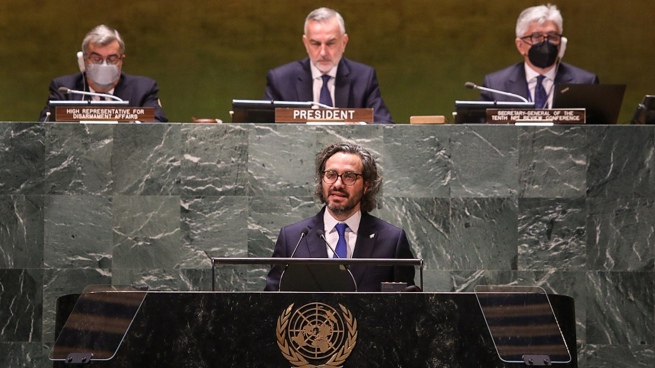Cafiero called for “complete, verifiable, transparent and irreversible nuclear disarmament” at the UN
WATCH VIDEO
The chancellor santiago cafiero demanded this Monday a “greater commitment” of the countries possessing nuclear weapons to make effective a “complete, verifiable, transparent and irreversible disarmament” and questioned the United Kingdom for sending a nuclear arsenal to the South Atlantic during the Falklands War in 1982 and for maintaining an “unjustified” military presence in the archipelago.
When exposing in 10th Nuclear Non-Proliferation Treaty Review Conference (TNP) that takes place at the United Nations headquarters in New York, Cafiero also highlighted the “commitment” of Argentina and the rest of the Latin American countries with the “validity and objectives of the Treaty,” reported the Palacio San Martín it’s a statement.
“The world is marked by growing tensions and conflicts that have escalated to levels that could have been avoided through a greater commitment to the dynamics of negotiation and peace,” said the Argentine foreign minister before the representatives and experts from 191 countries that make up the NPT present at this global meeting chaired by Argentina.
In this context, he asked: “50 years after the entry into force of the Treaty with testimonies of progress and setbacks, is this a valid instrument today? Do you still have the vigor and strength enough?
Subsequently, the head of the San Martín Palace trusted that the current Conference “will constitute a key instance to revalidate the vital role of the NPT and our commitments to the rights and obligations in terms of disarmament, non-proliferation and peaceful uses of nuclear technology “.
Likewise, he maintained that “as a member of the Stockholm Initiative, Argentina reaffirms its traditional support for the various plans to advance towards complete nuclear disarmament, in a verifiable, transparent and irreversible manner.”
Cafiero also said that “Russia’s invasion of Ukraine changed the international scene and high world leaders began to speak of a Third World war. However, the arms race had been going on for a long time.”
“The world is marked by growing tensions and conflicts that have escalated to levels that could have been avoided through a greater commitment to the dynamics of negotiation and peace.”santiago cafiero
“Different international studies affirm that expenses have been growing since 2015. And only for 2020 and 2021, 2 years also marked by the pandemic, the record of 4 billion dollars was spent,” he assured.
In this sense, he emphasized: “Today the invasion of Ukraine can function as a justification for countries without nuclear weapons to want to seek it. The uncomfortable questions that we must ask ourselves during these weeks of work are whether we are at the dawn of a new cycle of an arms race, of proliferation of nuclear weapons, whether we are about to go from temptation to impulse.”
“These chiaroscuros have been systematic over the years,” he said, specifying: “This January alone, the five permanent members of the UN Security Council, who together possess 12,270 nuclear warheads out of a total of 12,705, demonstrated against the proliferation of these weapons and affirmed that “a nuclear war cannot be won and should never be waged. However, in 2021, the year in which Covid19 was being fought, these countries allocated more than US$ 77,000 million dollars to modernize their nuclear arsenals”.
At the United Nations we demand complete, verifiable, transparent and irreversible nuclear disarmament. Go from words to deeds.
In 2020 and 2021, the member countries of the Security Council spent US$4 trillion in the arms race. pic.twitter.com/1HCUp9XuZi
– Santiago Cafiero (@SantiagoCafiero) August 1, 2022
On the other hand, Cafiero referred to the Malvinas issue: “It is particularly important in light of the prolonged and unjustified UK military presence in the South Atlantic, complement of the usurpation of lands and seas surrounding our country, which includes the displacement of submarines capable of carrying nuclear weapons in this Denuclearized Zone”.
In this sense, the Argentine foreign minister recalled the public appearance of declassified documents in the National Archives in London that “prove that, during the 1982 South Atlantic conflict, the United Kingdom sent ships equipped with 31 nuclear weapons to the regionwhich at that time represented 65% of its stock of deep-sea nuclear bombs”.
And he maintained that “in addition to being a significant amount, The mere presence of these weapons implied, not only for Argentina but for the entire region, a serious nuclear risk both in terms of radioactive contamination in the South Atlantic, as well as the catastrophic humanitarian consequences associated with nuclear weapons”.
In another order, he explained that Argentina’s commitment to non-proliferation “is also evidenced through the Brazilian-Argentine Agency for Accounting and Control of Nuclear Materials (ABACC)”, an agency that -he said- forms part of a “State policy validated by all the political forces in Argentina since the Argentine and Brazilian democracies signed their first agreement to build mutual trust in 1985.”
“The ABACC provides the international community with unequivocal guarantees of the exclusively peaceful nature of our nuclear programs,” the foreign minister added.

Also participating in the Conference chaired by Argentine Ambassador Gustavo Zlauvinen are the Secretary General of the United Nations, António Guterres, and the Director General of the International Atomic Energy Agency (IAEA), Rafael Grossi.
The NPT Review Conference -which takes place every five years and was postponed from 2020 due to the Covid 19 pandemic- allows the implementation of the treaty to be reviewed and, on this occasion, chaired by the Argentine Republic “as a new recognition in terms of international security and nuclear energy, presents important challenges in the face of the war in Europe”, highlights the statement from Palacio San Martín.
The NPT is a key international treaty that aims to prevent the spread of nuclear weapons and weapons technology, promote cooperation in the peaceful uses of nuclear energy, and advance the goal of achieving nuclear disarmament and general and complete disarmament. .
It is the only multilateral treaty that represents a binding commitment for the States possessing nuclear weapons with respect to the objective of disarmament.
From the Palacio San Martín, it was recalled that Argentina “has an active and historical regional and global participation in the matter, defending the role of multilateralism in general, and that of the United Nations in particular.”
Likewise, it was stressed that Argentina “considers that weapons of mass destruction constitute one of the main sources of threats to world stability, and its adherence to the Treaty on the Non-Proliferation of Nuclear Weapons is inscribed within this framework.”
















